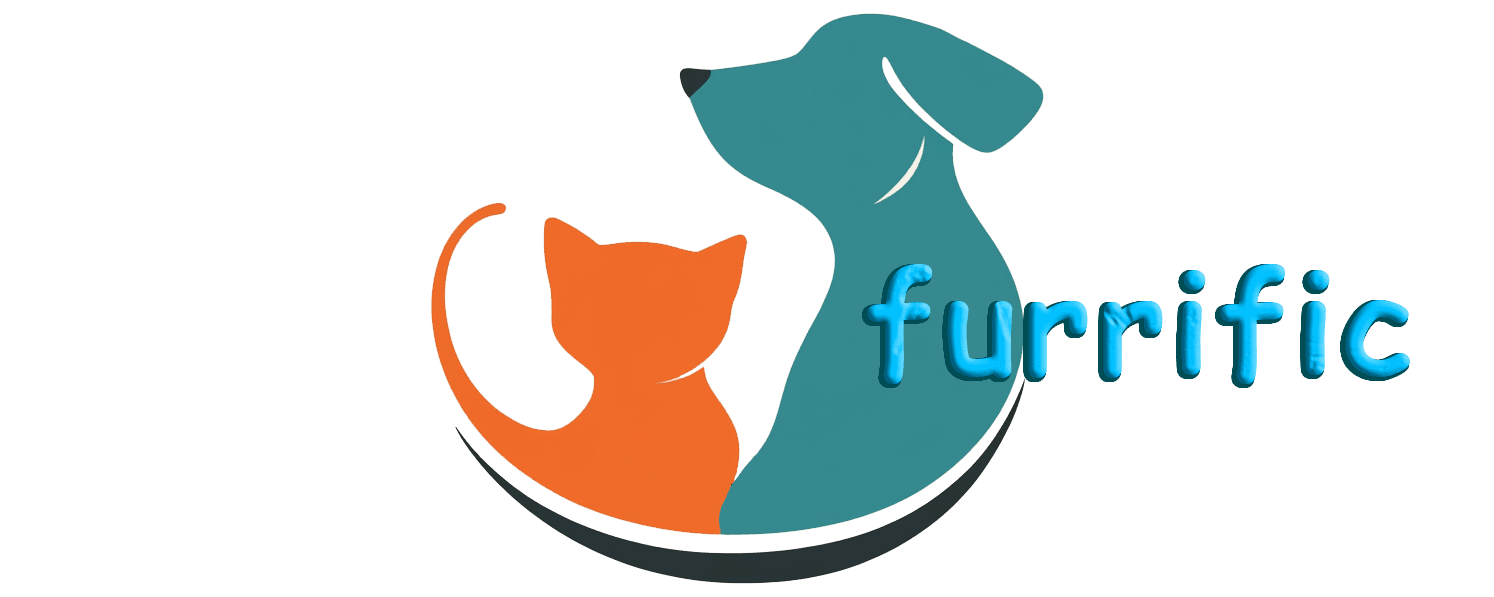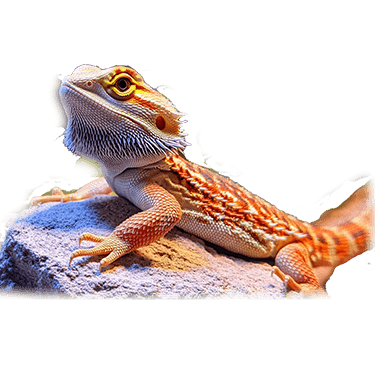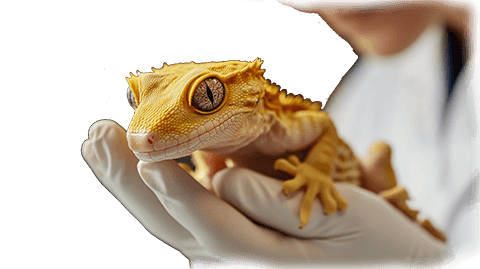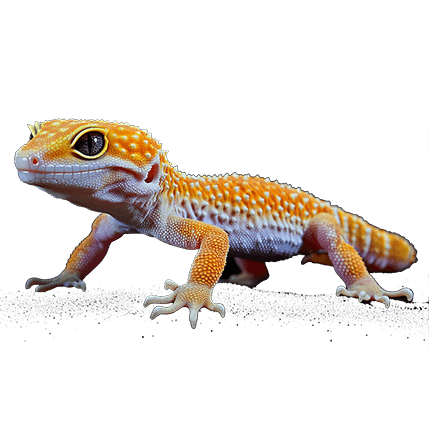Ball Python Health: Ensuring the Well-Being of Your Pet Python
Ball pythons are known for being hardy and relatively easy to care for compared to other reptile species. However, maintaining their health requires proper husbandry, including the right temperature, humidity, diet, and environment. In this guide, we’ll cover common health issues, preventive care tips, and warning signs to help you keep your ball python in optimal condition.
Common Health Issues in Ball Pythons
Even with good care, ball pythons can encounter certain health problems. Being aware of the most common issues can help you take prompt action.
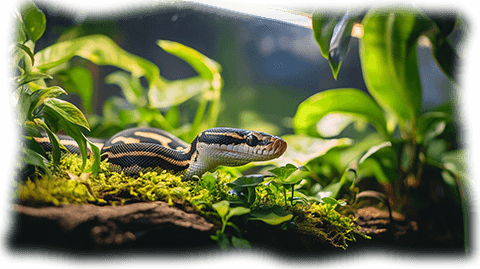
Respiratory Infections
Respiratory infections are one of the most
common health issues in ball pythons, often caused by improper temperature or humidity levels in their enclosure.
- Signs to watch for:
- Open-mouth breathing
- Wheezing or crackling sounds when breathing
- Excessive mucus around the nose or mouth
- Lethargy and refusal to eat
- Preventive tips:
- Ensure the enclosure’s temperature gradient is between 75°F and 85°F (with a basking spot around 88°F-92°F).
- Keep the humidity levels around 50-60%, increasing it slightly during shedding.
- Clean the enclosure regularly to reduce the risk of bacterial infections.
If you notice these symptoms, consult a reptile veterinarian immediately. Respiratory infections can worsen quickly, and treatment may include antibiotics.
Parasites
Internal and external parasites can affect ball pythons, especially if they are wild-caught or exposed to contaminated environments.
- Signs to watch for:
- Lethargy or reduced activity
- Loss of appetite
- Abnormal shedding
- Presence of mites (tiny black or red dots on the skin or in the water dish)
- Preventive tips:
- Always quarantine new ball pythons before introducing them to an existing collection.
- Clean and disinfect the enclosure regularly, including the water bowl and hide spots.
- If mites are present, use reptile-safe mite treatments and consult a veterinarian for guidance on internal parasites.
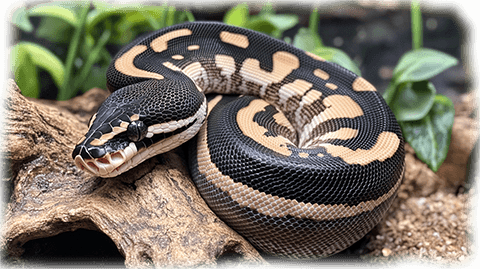
Shedding Problems (Dysecdysis)
Healthy ball pythons shed their skin in one complete piece. However, poor husbandry conditions or dehydration can lead to incomplete or problematic sheds.
- Signs to watch for:
- Retained patches of skin after shedding
- Difficulty shedding the eye caps (visible retained eye caps can cause blindness if left untreated)
- Preventive tips:
- Maintain the enclosure’s humidity at the recommended 50-60%, increasing it to 65-70% during shedding cycles.
- Provide a shedding box with moist sphagnum moss or damp paper towels. (Amazon affiliate link)
- Ensure your ball python is well-hydrated by offering clean water and misting the enclosure. (Amazon affiliate link)
If retained skin persists, a soak in lukewarm water for about 20-30 minutes can help loosen the stuck shed. Gently assist your python, but never force the skin off, especially around the eyes.
Stomatitis (Mouth Rot)
Stomatitis, commonly known as mouth rot, occurs when the ball python’s immune system is weakened, often due to poor husbandry or stress.
- Signs to watch for:
- Swollen or reddened gums
- Pus or discharge around the mouth
- Refusal to eat
- Foul odor coming from the mouth
- Preventive tips:
- Keep the enclosure clean and free from sharp objects that can cause mouth injuries.
- Ensure the python’s enclosure maintains stable temperatures and humidity.
- Reduce stress by limiting excessive handling, especially during shedding or right after feeding.
Mouth rot requires prompt veterinary care. Your vet may prescribe antibiotics or antiseptic rinses to treat the infection.
Obesity
While ball pythons are typically slow-moving reptiles, overfeeding or lack of exercise can lead to obesity, which can shorten their lifespan and increase their risk of health issues.
- Signs to watch for:
- Noticeably thick body with rolls of fat
- Lack of activity, even during normal active periods
- Difficulty moving around the enclosure
- Preventive tips:
- Feed adult ball pythons every 10-14 days, based on their size and weight.
- Ensure your python has enough space to explore and move around in its enclosure.
- Avoid overfeeding or offering prey that is too large.
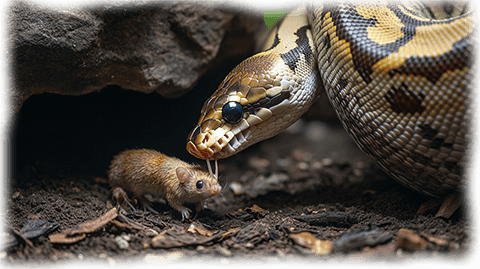
Preventive Care for Ball Pythons
Proper care and attention to your ball python’s environment can go a long way in preventing health problems. Here are some tips to ensure your python remains healthy:
- Maintain Optimal Enclosure Conditions:
- A temperature gradient is crucial for ball pythons, allowing them to thermoregulate. Ensure the cooler side is around 75°F and the basking area reaches 88°F-92°F. (Amazon affiliate link)
- Keep the humidity at 50-60%, and increase it during shedding to avoid dehydration and shedding issues.
- Clean the Enclosure Regularly:
- Spot clean daily to remove waste, and deep clean the entire enclosure every few weeks with reptile-safe disinfectants. Replace substrate regularly.
- Monitor Feeding and Hydration:
- Feed your ball python appropriately sized prey items. For adults, this should be about the size of the widest part of their body.
- Always provide fresh, clean water. Consider using a water dish large enough for your python to soak in.
- Regular Vet Visits:
- Schedule yearly check-ups with a reptile vet to ensure your ball python remains in good health. This also helps catch any developing issues early.
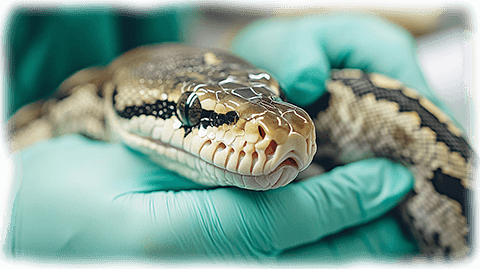
When to Visit a Vet
Ball pythons, like all pets, need veterinary attention when showing signs of illness. Visit a vet if you observe the following symptoms:
- Lethargy or lack of movement
- Loss of appetite for more than two consecutive feedings
- Open-mouth breathing or wheezing
- Abnormal shedding or retained skin
- Swelling or pus around the mouth (signs of mouth rot)
- Mites or other visible parasites
Early detection of health issues can prevent more serious conditions and ensure your ball python remains happy and healthy.
Reading materials: “Ball Pythons as Pets: Ball Python breeding, where to buy, types, care, temperament, cost, health, handling, husbandry, diet, and much more included! Caring For Your Ball Python” (Amazon affiliate link) by Lolly Brown.
Affiliate Disclosure
This post may contain affiliate links, which means I earn from purchases made through links. Please see the privacy policy page for more details.
